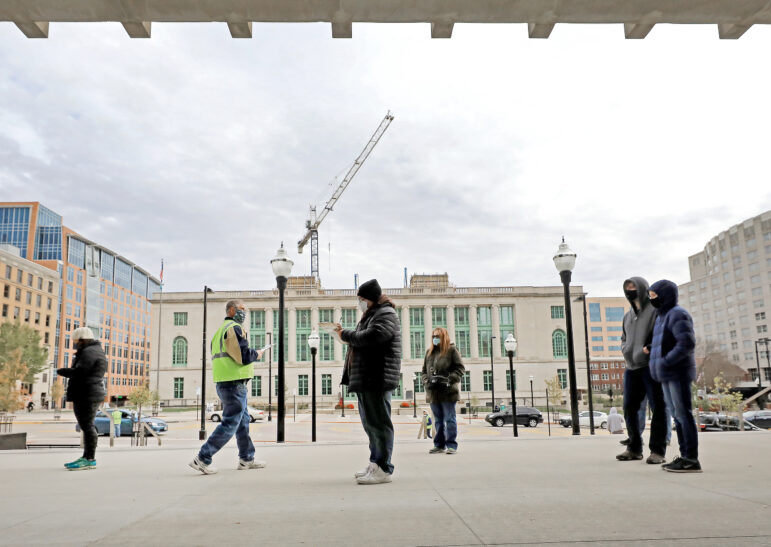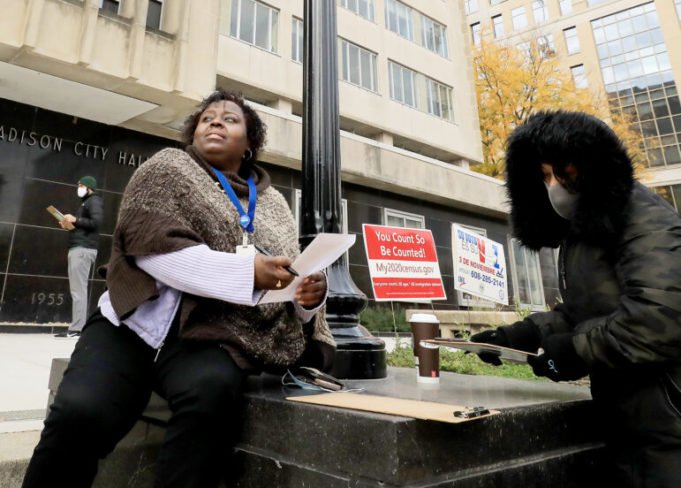As Calena Roberts sees it, voting on Election Day is a ritual. But it’s one that’s been disrupted this year.
“My mother-in-law’s 90 years old,” said Roberts, SEIU Wisconsin state field director. “And she and my husband and I, we’ve always made it an outing.”
For Roberts — and for many voters — plans for the first Tuesday in November look different. Her mother-in-law, Leora Roberts, lives in a facility that is locked down because of the COVID-19 pandemic. She can’t leave to cast her ballot in person, as in so many prior Novembers.
During the April primary, Leora Roberts never received her absentee ballot, her daughter-in-law said.
“I actually cried because she had not missed her vote in so many years,” Calena Roberts said. “And so it broke my heart that it didn’t get to her in time. So this time, she kept hounding me from April.”
Nearly seven months later, with the pandemic still raging and the living facility still locked down, the younger Roberts said her priority was to get her mother-in-law an absentee ballot. Both ended up casting their ballots early.
In a year transformed by the coronavirus pandemic, this election is unlike any other. Wisconsin is or has been subject to nearly 20 court cases related to its elections administration during the pandemic, according to the Stanford-MIT Healthy Elections Project.
And on the local level, municipalities and community groups are enacting safety precautions, such as making hand sanitizer readily available at the polls. But masks — although required in such settings by Gov. Tony Evers’ statewide mandate — are not required to vote.
The intense passions stoked by the presidential election have raised new concerns, too, about the presence of guns at polling places and the role of election observers. Officials have been trained to look out for voter intimidation, which is a felony, Wisconsin’s attorney general told Wisconsin Watch.
Amid these safety concerns — as well as typical worries about long lines and taking time off work — many voters chose the early route, said Keisha Robinson, program director at Black Leaders Organizing for Communities (BLOC), a community group based in Milwaukee.
As of 7 a.m. Sunday, more than 91% of the just over 2 million absentee ballots sent out had been returned, according to the Wisconsin Elections Commission. In each of the past two presidential elections, about 3 million people voted in Wisconsin.
But even with polls open for early voting and drop boxes available in cities across Wisconsin, some voters simply don’t trust early and absentee voting options, Robinson said, adding that some people have told her they want to see their vote cast with their own eyes.
Others will hit the polls on Tuesday for logistical reasons or because of problems with earlier attempts to vote.
The most important thing, Roberts said, is for voters to come out and make their voice heard at the polls however they can.
“People want their voices to be heard, and this is the way for it to happen,” she said.
Early voting is now closed, and voters have their last chance to cast their ballots tomorrow. Here’s what to expect:
COVID-19 precautions in place
Poll workers can do anything from greeting voters to counting ballots, but this year they’ll take on the extra roles of cleaning voting stations and enforcing social distancing. Some municipalities, such as Milwaukee, hired additional workers to help with these tasks. Milwaukee will have 1,000 more poll workers on Tuesday than it did in 2016.
Some locations will have tape on the ground to mark where it is safe to stand. Voters also will be asked to use hand sanitizer.
As in previous elections, the National Guard will deploy soldiers in civilian clothes to work at the polls, according to Brig. Gen. Robyn Blader of the Wisconsin National Guard. Among their roles will be to supply personal protective equipment, hand sanitizer and other materials related to COVID-19 safety.
Community organizers also will be on the ground to provide supplies. Darrol Gibson, managing director of Leaders Igniting Transformation (LIT), a statewide youth organizing group, said his staff will be stocked up with masks, hand sanitizer, gloves and water to provide to voters and poll workers.
People experiencing COVID-19 symptoms are encouraged to take advantage of curbside voting, if available. This option also can be used by people with disabilities or who are immunocompromised.

(John Hart / Wisconsin State Journal)
Masks encouraged, but not required
Voters can’t be turned away from polling places if they refuse to wear a mask.
“The (Wisconsin) Elections Commission has unanimously recommended that all voters wear masks, but they cannot be required to wear one,” spokesman Reid Magney said.
Although Evers’ order requiring all Wisconsin residents to wear masks exempts voters, Magney said poll workers and election officials are required to wear them.
Molly Collins, advocacy director at ACLU Wisconsin, said a variety of organizations are teaming up with polling places around the state to provide masks for voters. As a backup, election workers and volunteers also will be enforcing social distancing and sanitizing polling stations, she said.
Intimidation a felony
Voter intimidation is a felony in Wisconsin, and it is also a federal crime to “intimidate, threaten, (or) coerce … any other person for the purpose of interfering with the right of (that) other person to vote or to vote as he may choose,” according to federal criminal code.
On the state level, “It’s a crime that not only is a felony, but one that is an attack on our democracy,” Wisconsin Attorney General Josh Kaul said. “If anybody engages in that conduct, they should expect to be investigated and to spend time behind bars.”
Voters who feel threatened at their polling places should contact their election inspector, who can order someone removed, Kaul advised. A voter also may call police, or the inspector may choose to do so, he said.
Kaul added that a voter should not engage with the intimidating person directly. Election inspectors are trained in de-escalation, he said, and to ensure “that the voting process is interfered with as little as possible.”
Guns allowed at some polling places
Each municipality can decide whether guns are allowed at a polling place, but some locations have their own restrictions.
At K-12 schools, firearms are banned statewide. Private or government buildings also can post prohibitions on weapons, which must be observed by voters. Although Milwaukee election officials haven’t issued any prohibitions on firearms, many polling places are in or near schools, and firearms are forbidden within 1,000 feet of these buildings.
Some municipalities have decided to place broad restrictions on weapons at polling places. The Green Bay City Council approved a ban on firearms and weapons at polling places on Oct 20. Some poll workers felt unsafe due to voters’ carrying weapons inside polling places, said Celestine Jeffreys, chief of staff for Green Bay Mayor Eric Genrich.
Although she hopes voters see the move as an attempt to keep everyone safe at the polls, the community’s response has been split, with some appreciating the action and others “who really believe that we’ve done something wrong,” Jeffreys said.
A person who uses a firearm to intimidate a voter at a polling place could be punished under Wisconsin voter intimidation laws.
“In those circumstances, the election inspectors or the local law enforcement are still empowered to take appropriate action,” Kaul said.
Police may be present
Police are permitted at polling places, and can check in with the chief inspector to ensure there haven’t been any problems. While this is a regular practice, the ACLU’s Collins said police responding to disputes at polling places can be disruptive for voters.
“Police presence at a poll does tend to deter people of color from going into the poll and might deter other folks as well,” Collins said.
Unauthorized militias are forbidden by Wisconsin law, but a report by the Armed Conflict Location and Event Data Project lists Wisconsin as one of five states at the highest risk of militia activity during the election.
The highest risk states include “locations that have seen substantial engagement in anti-coronavirus lockdown protests” and where “militias might have perceptions of ‘leftist coup’ activities,” according to the project, which tracks political violence and protest worldwide.
“We don’t have any specific information regarding any militia effort to interfere with the voting process,” Kaul said, “but if we do become aware of that, we will respond swiftly.”
Watching the poll watchers
Volunteer poll watchers, or election observers, are allowed in polling places. State parties and the national election campaigns have recruited poll watchers, although a person does not have to be affiliated with a party or candidate to volunteer.
Poll watchers are not allowed to attempt to sway voters or wear campaign clothing or buttons. They cannot handle official documents, nor look at confidential voter information, such as registration forms or a voter’s proof of residence.
This year, President Trump has specifically called for poll watchers to keep an eye out for incidents of voter fraud. Others say poll watchers are there to protect voters, because an observer can identify instances of impropriety or intimidation.
But observers can also be intimidating, suggested Claire Woodall-Vogg, executive director of the Milwaukee Election Commission. Poll workers have been trained on the rules that election observers must follow, she said.
Anyone can be a poll watcher. Individuals don’t have to live in Wisconsin, or be a U.S. citizen, but they must bring their ID to the polling place, register with the chief election observer, and wear a tag or badge.
An observer found to be disruptive or in violation of the rules can be dismissed, according to the Wisconsin Elections Commission, and Woodall-Vogg said that chief election inspectors have been instructed to call the police on observers that do not follow rules. This year, they must also wear a face covering, such as a mask, to protect against the spread of COVID-19.
Calena Roberts looks forward to returning to her family’s ritual of voting in person. But most important to her right now is for the voices of everyday people to be heard.
“We don’t have a platform; we can’t stand on the legislative floor and talk stuff to the world,” she said. “But this is a way for people’s voices to be heard, and make people listen.”
______________________
How to report a problem at your polling place
Polls open at 7 a.m. and close at 8 p.m. Anyone in line to vote at 8 p.m. will be allowed to cast a ballot.
If you encounter problems while voting on Tuesday, contact the Election Protection Hotline at 866-OUR-VOTE (866-687-8683). To report a problem in Spanish, call 888-VE-Y-VOTA (888-839-8682).










